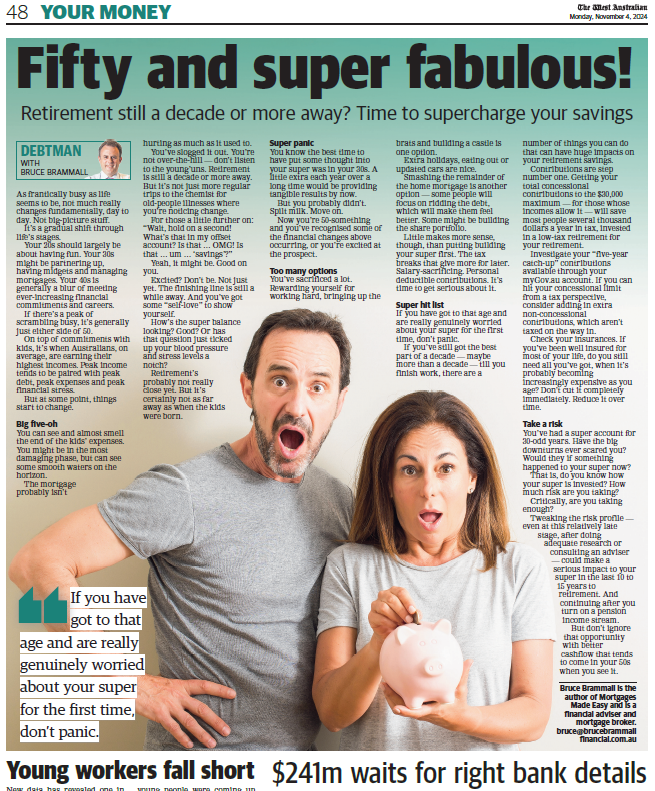
Bruce Brammall, The West Australian, 4 November 2024
As frantically busy as life seems to be, not much really changes fundamentally, day to day. Not big picture stuff.
It’s a gradual shift through life’s stages.
Your 20s should largely be about having fun. Your 30s might be partnering up, having midgets and managing mortgages. Your 40s is a generally a blur of meeting ever-increasing financial commitments and careers.
If there’s a peak of scrambling busy, it’s generally just either side of 50.
On top of commitments with kids, it’s when Australians, on average, are earning their highest incomes. Peak income tends to be paired with peak debt, peak expenses and peak financial stress.
But at some point, things start to change.
Big five-oh
You can see and almost smell the end of the kids’ expenses. You might be in the most damaging phase, but can see some smooth waters on the horizon. The mortgage probably isn’t hurting as much as it used to.
You’ve slogged it out. You’re not over-the-hill (don’t listen to the young’uns). Retirement is still a decade or more away. But it’s not just more regular trips to the chemist for old people illnesses where you’re noticing change.
For those a little further on: “Wait, hold on a second! What’s that in my offset account? Is that … OMG! Is that … um … ‘savings’?”
Yeah, it might be. Good on you.
Excited?
Don’t be. Not just yet. The finishing line is still a while away. And you’ve got some “self-love” to show yourself.
How’s the super balance looking? Good? Or has that question just ticked up your blood pressure and stress levels a notch.
Retirement’s probably not really close yet. But it’s certainly not as far away as when the kids were born.
Super panic
You know the best time to have put some thought into your super was in your 30s. A little extra each year over a long time would be providing tangible results by now.
But you probably didn’t.
Spilt milk. Move on.
Now you’re 50-something and you’ve recognised some of the financial changes above occurring, or you’re excited at the prospect.
Too many options
You’ve sacrificed a lot. Rewarding yourself for working hard, bringing up the brats and building a castle is one option.
Extra holidays, eating out or updated cars are nice.
Smashing the remainder of the home mortgage is another option – some people will focus on ridding the debt, which will make them feel better. So might building the share portfolio.
Little makes more sense, though, than putting building your super first. The tax breaks that give more for later. Salary sacrificing. Personal deductible contributions. It’s time to get serious about it.
Super hit list
If you have got to that age and are really genuinely worried about your super for the first time, don’t panic.
If you’ve still got the best part of a decade, maybe more than a decade, till you finish work, there are a number of things you can do that can have huge impacts on your retirement savings.
Contributions are step number one. Getting your total concessional contributions to the $30,000 maximum – for those whose incomes allow it – will save most people several thousand dollars a year in tax, invested in a low-tax retirement for your retirement.
Investigate your “five-year catch-up” contributions available through your Mygov account.
If you can hit your concessional limit from a tax perspective, consider adding in extra non-concessional contributions, which aren’t taxed on the way in.
Check your insurances. If you’ve been well insured for most of your life, do you still need all you’ve got, when it’s probably becoming increasingly expensive as you age. Don’t cut it completely immediately. Reduce it over time.
Take a risk
You’ve had a super account for 30-odd years. Have the big downturns ever scared you? Would they if something happened to your super now?
That is, do you know how your super is invested? How much risk are you taking?
Critically, are you taking enough?
Tweaking the risk profile – even at this relatively late stage, after doing adequate research or consulting an adviser – could make a serious impact to your super in the last 10-15 years to retirement. And continuing after you turn on a pension income stream.
But don’t ignore that opportunity with better cashflow that tends to come in your 50s when you see it.
Bruce Brammall is the author of Mortgages Made Easy and is both a financial adviser and mortgage broker. E: bruce@brucebrammallfinancial.com.au.
